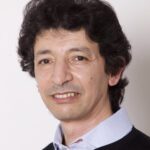Lien vers Pubmed [PMID] – 22185901
Lien DOI – 10.1097/WCO.0b013e32834ef8b2
Curr Opin Neurol 2012 Feb; 25(1): 42-9
Usher syndrome (USH) is the most prevalent cause of hereditary deafness-blindness in humans. In this review, we pinpoint new insights regarding the molecular mechanisms defective in this syndrome, its molecular diagnosis and prospective therapies.Animal models wherein USH proteins were targeted at different maturation stages of the auditory hair cells have been engineered, shedding new light on the development and functioning of the hair bundle, the sound receptive structure. Improved protocols and guidelines for early molecular diagnosis of USH (USH genotyping microarrays, otochips and complete Sanger sequencing of the 366 coding exons of identified USH genes) have been developed. Approaches to alleviate or cure hearing and visual impairments have been initiated, leading to various degrees of functional rescuing.Whereas the mechanisms underlying hearing impairment in USH patients are being unraveled, showing in particular that USH1 proteins are involved in the shaping of the hair bundle and the functioning of the mechanoelectrical transduction machinery, the mechanisms underlying the retinal defects are still unclear. Efforts to improve clinical diagnosis have been successful. Yet, despite some encouraging results, further development of therapeutic approaches is necessary to ultimately treat this dual sensory defect.


